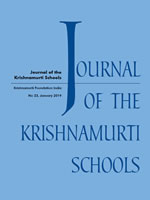Issue 23 - January 2019
- Written by J. Krishnamurti
Time is one of the most complex things to understand. It is fairly simple to understand it intellectually, but to see the meaning of it, to understand the nature of time, the significance of time, the depth of time, we must not only understand chronological time by the watch in our pocket or on our wrist, but also we must understand and observe the psychological thing which creates time as yesterday, today and tomorrow.
- Written by Kamala Mukunda
As I packed my bag for the editors’ meeting this year, a friend bid me goodbye, saying, “It’s going to be a lot of work, so get some rest.” It struck me that while the hours are long and the computer screens blaze into the night during these meetings, the work is very enjoyable.
- Written by Kabir Jaithirtha
Before I begin with education, I think it’s good to have a sense of what Krishnamurti was talking about—about life in general, about humanity—and then see how that connects with education.
- Written by Jeff Welch
All experience, especially that of an educational bent—whether remembered accurately or not—builds the story of a fictional ‘me’, such as the one writing these words right now. All the accrued stories of my life define who I think I am, even including the stories around so-called self-knowledge, which is actually a ‘story’ telling a story. I’d like to unpack here all of our stories and to ask how have they helped us to live in the world.
- Written by Thejaswi Shivanand
- Written by Afshan Mariam
Thirty years ago, when a teacher had started building a school, she received a suggestion from the architect, “Make the windows four feet off the floor so that the children don’t look outside”. Keeping children inside concrete walls, away from ‘distractions’, was a common practice.
- Written by Keerthi Mukunda
- Written by Stephen Smith
We are familiar with dialogue in film scripts and novels where it means, simply, a conversational exchange—one person speaks, the other responds. It began, probably, with the dawn of language itself. Only later, with the ancient Hindus and the Greeks, did it acquire the sense of a discourse pursued with the clear intention of arriving at truth.
- Written by Karen Hesli
For days I had been rummaging around in old poetry files; so granted, I was warmed up from reminiscing with old favourites, when a cherished magazine, Rethinking Schools (Summer 2010) surfaced. The cover enticed me with the colourful graphic, ‘The Power of Poetry’, and within minutes
- Written by O. R. Rao
On our street’s garbage heap
A child’s tattered open notebook
Marked in red 4/10 Belw Avg
Young couple on two wheeler...
- Written by Siddhartha Menon
Following the leader: me. No gaps!
Suppressed giggles; a survey finds
that they are all there, expectant, behind,
deadly serious about this game.
- Written by Jeff Welch
My generation was born of a terrible war
Ended by bombs never imagined before
...
- Written by Renu Galada
As children grow into their teens, their minds are fast developing in the intellectual space. As part of their increasing need for autonomy, they want to take decisions and do things on their own; discover their strengths; work over their likes and dislikes; and understand the complexities in societies.
- Written by R. Ramanujam
Some years ago, a couple of girls studying in class 10 approached me wanting to do a project in science. They were very excited about the internet and wanted the project to be a way of studying it. We had some discussions, and an idea from a colleague led to a very interesting project.
- Written by Ashton Macsaylor
As we move into a new school year, I find myself reflecting on our standards of assessment. Not state standards, pushed down on us from above, but our own standards, inner standards— standards of honesty, intelligence and kindness. Does the way we grade make sense?
- Written by Shashidhar Jagadeeshan
Many traditions over the years have been interested in a way of living grounded in something that is not man-made or created by thought. This way of living is imbued with a quality of flow, an ability to dance with life effortlessly and without a sense of division.
- Written by Anantha Jyothi
On a Saturday afternoon around twenty teachers—mostly house parents—had gathered for a workshop session called ‘Care for Care Givers’ conducted by Parivarthan Counselling, Training and Research Centre based in Bengaluru. What is noteworthy is that as a group of teachers, we were quite a loquacious lot, sharing views freely and yet, we struggled to express our emotions.
- Written by Editors
Imagine the following conversation as one taking place between a thoughtful educator, the questioner (Q), who wishes to start a new school, and an experienced teacher-administrator (T), who responds from her experience of working at an alternative school.
- Written by Sumitra M. Gautama
Can school be a place of radical change? Krishnamurti spoke about radical, fundamental change as the keynote of all learning—this learning is not in doing but in intense observing of oneself and reflecting upon it.
- Written by Venkatesh Onkar
Sapiens was first published in English in 2014 and has since become a best-seller of sorts, garnering many awards from prestigious institutions. It has also attracted much scholarly criticism, the main thrust of which is that the book overly generalises, makes too many speculative leaps and is not accurately referenced.
- Written by G. Gautama
This is an unusual book—with snapshots of experiences of people, students, teachers and parents, in school, out of school and with themselves—that takes the reader on an enquiry into everyday issues of teaching, learning, schooling and more. It has anecdotes and stories, all conveyed in a conversational style, through the diary entries of individuals or mails and letters that individuals share with each other.


